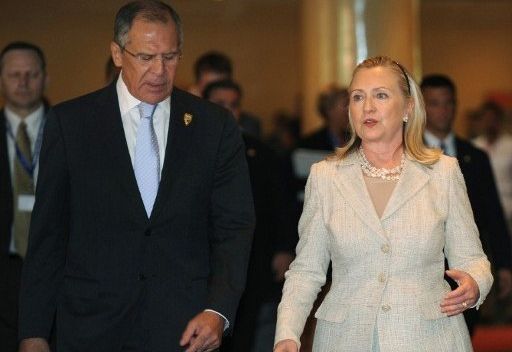Clinton unveils new aid for stricken Syrian civilians
Jo Biddle
NEW YORK, Jo Biddle- The United States unveiled $45 million in new aid to Syria Friday, and urged the global community to maintain its resolve as Syrian grassroots activists appealed to world leaders for help.
Hosting a meeting of the Friends of Syria group, Secretary of State Hillary Clinton said Washington was donating new funds to meet a growing humanitarian crisis caused by the country's bloody 18-month conflict that has claimed some 30,000 lives.

Clinton announced an extra $30 million to help get supplies and medical services to "the people suffering under the relentless assaults," bringing the US commitment to humanitarian funding to over $132 million.
She also unveiled an extra "$15 million to support Syrian civilian opposition groups," for a total of some $45 million of support to the unarmed opposition.
The latest aid would go toward helping "besieged communities inside Syria," the State Department said.
It would also provide medical and mental health care for children caught up in the fierce fighting, as well as provide clean water, materials for shelter, blankets and basic necessities, such as soap and pots and pans.
Clinton said the extra funds for the civilian opposition translated into "1,100 sets of communications equipment, including satellite-linked computers, cell phones and cameras, as well training for more than 1,000 activists."
But Washington has stuck by its refusal to provide arms and military support to the Syrian rebels fighting to oust President Bashar al-Assad, fearing it would further complicate the situation on the ground.
Nine Syrian activists, working with local coordination committees in cities such as Homs, were attending the meeting to spell out their needs to a gathering of about two dozen countries.
British Foreign Secretary William Hague revealed Britain was pumping another £8 million ($12.9 million) into the humanitarian fund for Syria on top of £30.5 million already pledged.
"The Syrian people have lost enough in lives, blood and suffering. It is down to us not to let them lose all hope too," Hague said after the meeting.
German Foreign Minister Guido Westerwelle agreed "we have to work for the long-term prospects of the Syrians, but we must take care of the needs of the Syrians today."
In areas taken by the opposition, people were beginning to organize themselves and "in these areas we must make available food, support and medicines, as well as repair the damaged infrastructure," he said.
And French Foreign Minister Laurent Fabius called for "more concrete aid" for the people in liberated areas who "feel they have been abandoned."
But in his speech to the UN General Assembly, Russian Foreign Minister Sergei Lavrov insisted the Geneva accords adopted on June 30, which do not call for Assad to step down, should be the basis of any transition plan.
"Those who oppose the implementation of the Geneva communique take upon themselves an enormous responsibility. They insist on a ceasefire only by the government and encourage the opposition to intensify hostilities."
Russia and China have so far blocked three UN Security Council resolutions aimed at tightening sanctions on Assad.
Clinton also denounced Iran for its role in the conflict, amid allegations that Tehran is supplying arms and support to the Assad regime.
"The regime's most important lifeline is Iran," she said. "There is no longer any doubt that Tehran will do whatever it takes to protect its proxy and crony in Damascus."
And she appealed to all nations to step up their response, particularly to a UN appeal that remains "woefully underfunded."
"Our resolve must not waiver as we continue to do what we can to end the violence and bloodshed and bring about a better day for the Syrian people," Clinton said.
One of the major concerns is the growing refugee crisis. About one million to 1.5 million people are internally displaced, with a further 300,000 having slipped into neighboring countries, according to UN estimates.
Earlier this week, Jordan's King Abdullah II said in his speech to the UN General Assembly that his country, which is hosting a large number of the Syrian refugees, was grateful for the international community's support.
"The somber reality is, however, that more will be needed, as the camps grow more crowded with vulnerable families and the cold desert winter approaches," he warned.
----------------------------------------------------------------------------------------